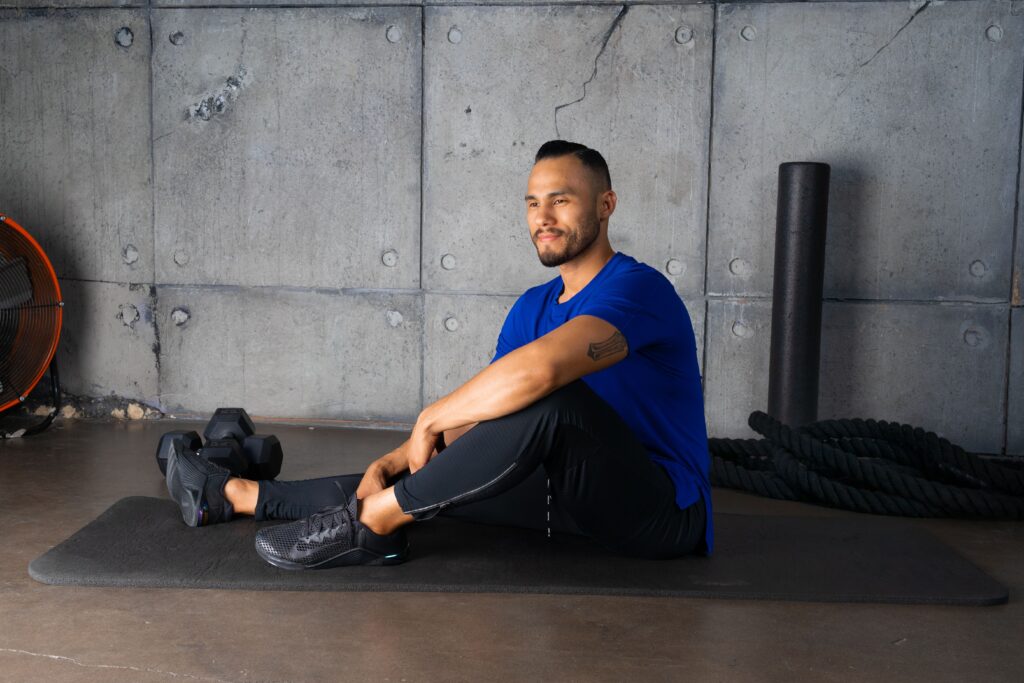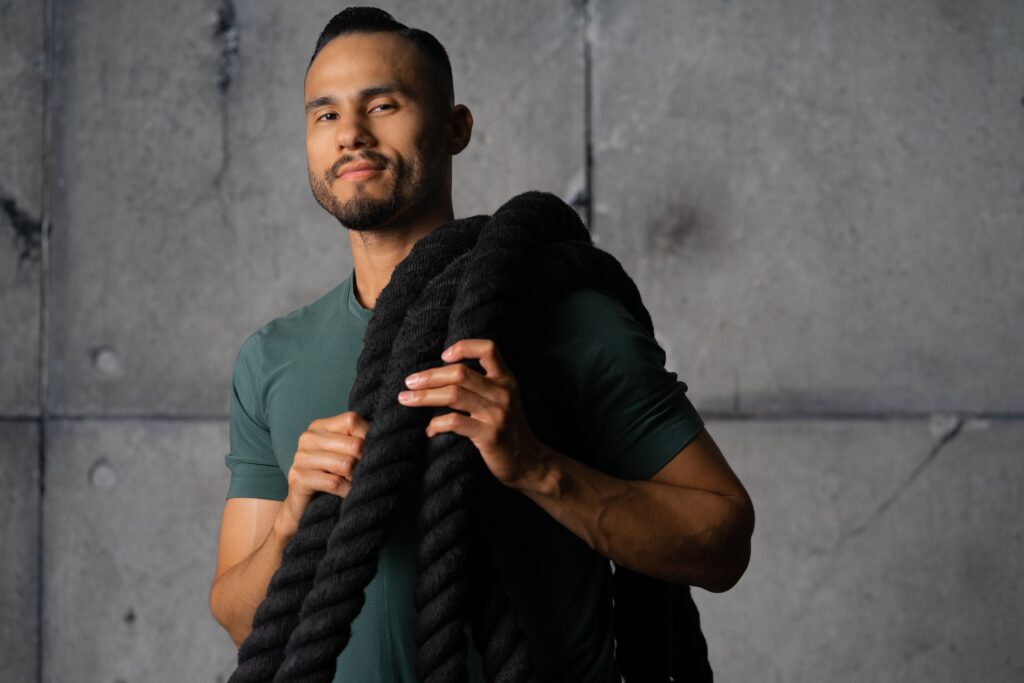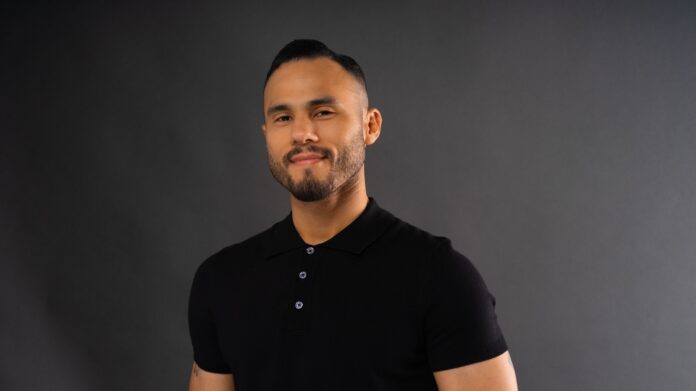( ENSPIRE Feature ) Despite Numerous Challenges, Adrian Ceja Manages to Help Others With His Own Company and Fitness Program
ENSPIRE Contributor: Keegan Kerns
Ever since his childhood, Adrian Ceja has known adversity, both physical and emotional. However, as he has continued to battle that adversity throughout his life, he has managed to overcome it and use it to create his own programs to help others overcome similar physical and emotional challenges. This inner strength and determination enabled Adrian Ceja to graduate from Orange Coast College, obtain his certification from the National Academy of Sports Medicine and the International Sports Sciences Association, and become a private fitness coach, among many other achievements geared towards the community.
Many of Adrian Ceja’s most significant challenges came from his early life. He grew up in a single-parent home and quickly learned the emotional difficulties of losing a dear family member when he lost his grandmother to diabetes. Additionally, due to a car crash, Adrian developed a speech impediment, making him feel as if he didn’t have a voice. However, as he dealt with these challenges, Ceja learned how to take what he was passionate about and use it to overcome these trials. Ceja says that as he learned more and more about the fitness world and became more passionate about it, he “realized around that time that when I spoke about health and fitness, it felt as if the stutter was behind me. It felt as if there was no fear of sharing anything”. Because of this tremendous change for him, he’s continued to dive into the world of health and fitness as a private coach to help share the positive physical and emotional effects that it provides.

ENSPIRE was able to talk to Adrian Ceja about his early life, how he got into fitness, and his goals for the future, among other things.
You’ve overcome a lot of adversity in your life, including a stuttering impediment. You’ve mentioned that it began to feel like the stutter was behind you when you spoke about health and fitness, those being two things you were and are passionate about. When did you realize your passion for those activities, and when did you realize how it helped you with the speech impediment?
Fortunately, I realized this early on. My grandmother died from diabetes complications when I was in high school, so a few years later, I noticed helping people in this arena was something I wanted to commit to. To live our best lives, we need our health. So with this taken care of, we can honestly go to the next level in our life.
Sometimes I feel like I’m still processing how it’s helping my speech impediment today. Even though I may not know entirely, I am so grateful that it helps me process. So many can probably relate to this, but it’s when I think of stuttering that it comes out most, unfortunately. So, I try to focus on health and fitness, which helps me not be so self-conscious about my impediment.
As you continued to get into the world of fitness, were there any figures that initially inspired you?
Yes, and I wanted to be just like them-ha. But we’re all our own person. I remember when I was younger watching this television series on ABC called Extreme Weight Loss. The host of the show was a personal trainer named Chris Powell. I loved how he was helping people change their lives around. I thought it was the coolest thing, and I wanted to do that too. Chris Powell still inspires me today. In fact, I told him when I met him. I met him in 2019 at the National Academy of Sports Medicine’s Optima Fitness Conference, in Phoenix Arizona. Pretty cool dude. I almost wanted to challenge him to some push-ups.
As a personal trainer, how do you view the connection between positive emotional and mental wellbeing and physical fitness, and how do you maximize that connection with your clients?
This is a great question. In the past decade, more and more science has come out supporting the mental health benefits of exercise. I think a more positive attitude is a by-product of exercise. I like to tell my clients that winning compounds. When we get a sense of winning in exercise by completing the workout or simply challenging ourselves to do more, it sets us up and motivates us to keep winning even outside of their fitness journey. I see it all the time in my clients. I oftentimes joke with some that by working with me, they’ve gone on to win in their finances and make more money. But we’ll leave that conclusion up to them.
Exercise has been shown to improve activity in the brain linking it to improved mood, improved self-worth, and helping to reduce symptoms of depression. Research also finds that physical activity produces “feel good” hormones like dopamine and serotonin.
As part of your program, you created the Ceja Method. What led you to develop this, and what makes it unique?
The Ceja Method has brought so much clarity to me. I discovered a need for busy professional people. It was to simplify fitness and nutrition sustainably, removes the confusion of calorie counting, and achieves results for people. I knew busy professionals needed a more straightforward approach. Not a one-size-fits-all. So, the Ceja Method is a three-phase systematic process designed to simplify fitness and nutrition, a healthier lifestyle, and achieve sustainable results.
The first phase is all about consistency and fundamentals. These things matter. And far too often, we want to just quick-fix our way to health. But it just doesn’t work that way.
You’ve done other public work, such as Operation Healthy Lives at the Rock Church. How does it feel to be a part of such programs, and how important do you think they are for ensuring the health of larger communities?
I cherish OHL so much. We’ve seen people transform in many different ways, and I’m so glad I get to be a part of it. OHL is the bridge between our spiritual health and physical health, but it positively impacts our mental wellbeing. The statistics give us a wide view of our current health crises; 45% of U.S. adults have at least one chronic disease, 70% of all deaths are attributed to chronic diseases, and more than half of U.S. food consumption are processed foods high in sugars, refined carbs, and unhealthy oils. OHL combats these issues with our teachings on healthy eating, exercise, and coaching. You can check out our Instagram page at @operationhealthylives.
You’ve already accomplished so much with the Ceja Method and your coaching business, but what is your ultimate professional or personal goals?
I believe I’m still in this season of coaching, but down the line, I think it’ll look different. I see myself doing transformation coaching at a more elite level and larger speaking engagements speaking on transformation. I want to do more deep dive with people on things like mindset and change. Maybe I can come back on here later and share more about that.
In the meantime, follow my journey on my website.

Overall, Adrian Ceja has used his struggles to build both himself up and a way to share the importance of physical fitness and the emotional and mental benefits it provides with others. Ceja provides an excellent example of a model citizen who constantly strives to lift others up with his actions, whether it’s in his professional or personal life. Whether it be the lessons he teaches as a personal trainer or the work he does for larger public groups such as Operation Healthy Lives, Adrian Ceja is always working to show everyone how they can live their best lives in the healthiest way possible.
Related Articles: Arazi Fitness Adapts to COVID-19 with New Antimicrobial Workout Gloves
Subscribe to the ENSPIRE Magazine Newsletter to get updates on our upcoming “Be-Well” Digital/Print Issue.







